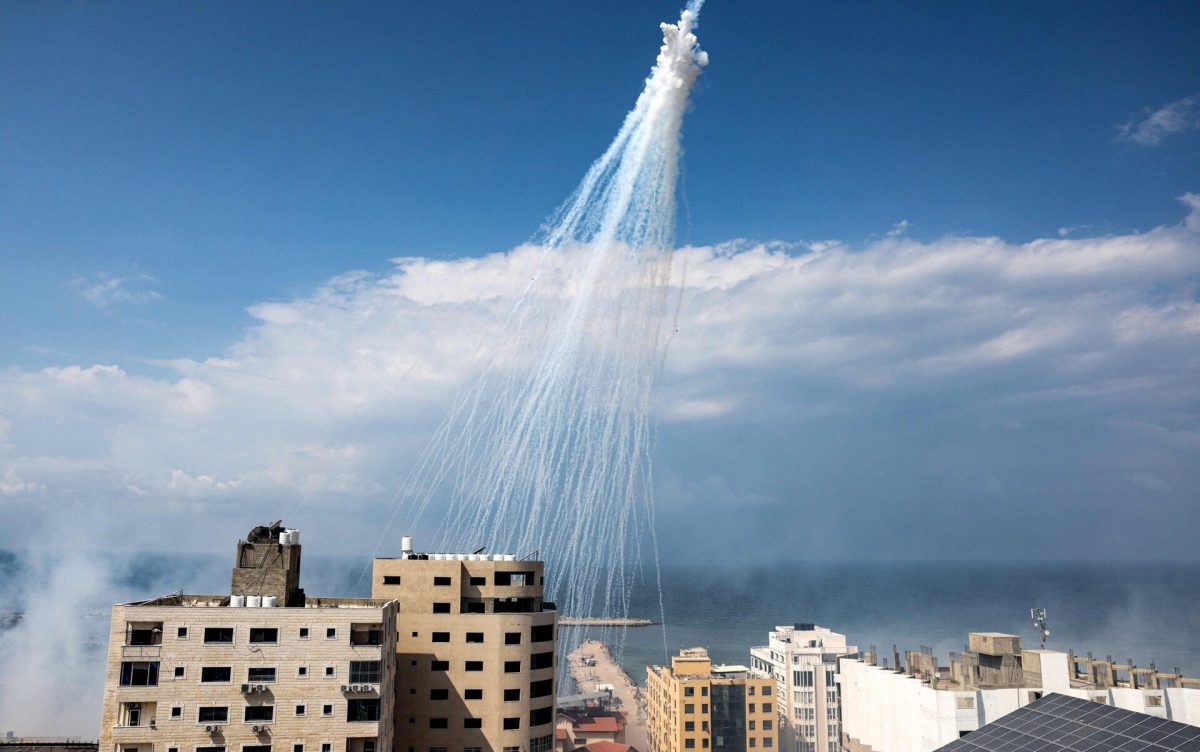The rights group said it verified videos taken earlier this week “showing multiple airbursts of artillery-fired white phosphorus over the Gaza City port and two rural locations along the Israel-Lebanon border”.
HRW noted the weapon “has a significant incendiary effect that can severely burn people and set structures, fields and other civilian objects in the vicinity on fire”.
It added that the use of white phosphorus in densely populated places like Gaza “magnifies the risk to civilians and violates the international humanitarian law prohibition on putting civilians at unnecessary risk”.
The Palestinian Foreign Ministry has claimed in a social media post on Tuesday the Israel Defense Forces (IDF) has used white phosphorus munitions in its strikes against Gaza. showing the aftermath of an alleged strike using the incendiary weapon.
White phosphorus munitions are not banned under international law, but their use is tightly regulated. These munitions should not be used in densely populated areas, due to the threat they pose to civilians, according to the 1980 UN Convention on Certain Conventional Weapons.
A video published by the Palestinian Foreign Ministry on X (formerly Twitter) shows a large, barren area near buildings covered with a significant number of small flare-like objects that are still burning and releasing thick white smoke. No casualties or recent damage to the nearby buildings can be seen in the footage.
“The Israeli occupation is using internationally banned white phosphorus bombs against the Palestinians in the Karama neighborhood in northern Gaza,” the ministry alleges, in a caption with the clip.
Munitions filled with white phosphorus are commonly used by the military to create smokescreens and conceal the movement of troops, due to their ability to produce a large amount of smoke. It can also be used to mark enemy targets. However, they also have incendiary qualities that make them particularly dangerous for humans.
White phosphorus ignites through simple contact with air due to its interaction with oxygen. It burns at a temperature of between 800C and 2,500C. Having a wax-like nature, the substance easily sticks to various surfaces, including clothes and skin, and is extremely difficult to wipe off or extinguish. It is known to cause deep burns as far as the bone, while the remnants of the substance contained in human tissue can potentially reignite after initial treatment when it makes contact with air again.
Israel is known to have repeatedly used white phosphorus munitions in the past. In 2006, the Israeli government admitted to using these weapons during its months-long war with Lebanese armed group Hezbollah. Israel insisted at the time that it used the munitions in accordance with international law, despite numerous media reports that they were fired in particular at areas with civilian populations.
In 2009, Israel acknowledged using “munitions containing white phosphorus” during an offensive in Gaza between December 2008 and January 2009.
Previously, the military was heavily criticized by Human Rights Watch for these actions, described as “evidence of war crimes” by the NGO. According to the media, the use of these munitions also led to a UN compound in Gaza partially burning down after coming in contact with the incendiary substance at the time.
In April 2013, Israel claimed it would stop using white phosphorus munitions to create smokescreens and would switch to gaseous substances for these purposes.
The latest escalation between Hamas and Israel began early on Saturday, when the Palestinian fighters launched a surprise attack on multiple locations along the Gaza border in response to Israel’s repeated aggression against Palestinians and desecration of the al-Aqsa Mosque.
Israeli officials estimate that more than 1,300 people have been killed in the Hamas assault and over 3,000 have been wounded.
Israeli massive air strikes on the densely-populated Gaza Strip, has so far killed almost 1,500 people.
The UN announced on Tuesday it would launch a war-crimes investigation against both sides, citing “clear evidence” that there are violations of international law.
